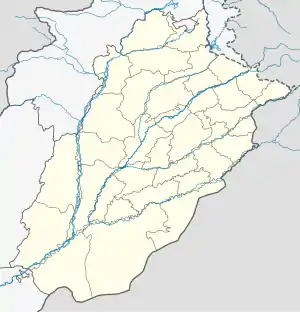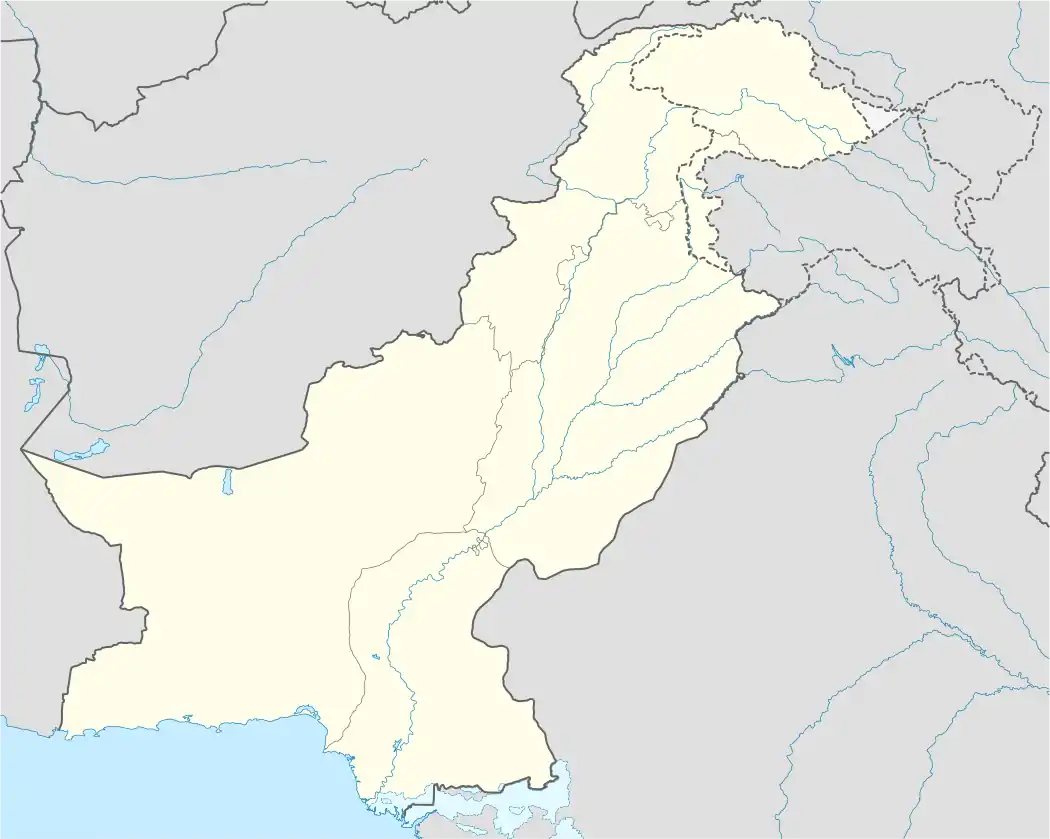| Rawat Fort قلعہ روات | |
|---|---|
| Rawat, Punjab, Pakistan | |
 A view of the fort's main entrance | |
 Rawat Fort قلعہ روات  Rawat Fort قلعہ روات | |
| Coordinates | 33°29′53″N 73°11′39″E / 33.4981°N 73.1942°E |
| Type | Fort |
Rawat Fort (Urdu: قلعہ روات) is an early 15th century fort in the Pothohar plateau of Pakistan, near the city of Rawalpindi in the province of Punjab.[1]
Location
It is 17 km east of Rawalpindi on Grand Trunk Road. The 2nd century Mankiala stupa can be seen from the roof of the fort's mosque. The fort is located approximately 50 miles from the vast Rohtas Fort, which had been built by Sher Shah Suri to establish control of the Pothohar region.
Etymology
Rawat Fort derives is named from the Arabic word Rabat (Arabic: رباط), meaning caravanserai - an inn for caravans.[2]
History
The fort is said to have founded as a caravanserai in the 15th century by the Delhi Sultanate. However, Pothohar was under control of Malik Jasrat during this period, and he was probably its original builder. Jasrat is known to have constructed a series of other forts in the region.[3] The caravan itself may have been built atop a Ghaznavid-era fort that was established in 1036 CE.[4] it came under control of The caravanserai was then later fortified in the 16th century by the Mughal emperor Humayun in order to defend the Pothohar plateau from Sher Shah Suri's forces.[5] The fort was the scene of a battle between Humayun and Sher Shah Suri in 1546.[6]
Layout
The fort is almost in square form and has two gates. There is also a quadrangular building with a dome in the fort's inner area – an area which also contains many graves. Along the perimeter are several small cells, which may have originally been small rooms rented out to itinerant merchants.The fort also contains a mosque with three domes.[7]
Conservation
The fort is federally protected as a Cultural Heritage Site of Punjab, and is managed by the Ministry of Information, Broadcasting and National Heritage. In November 2016, a conservation plan was commissioned for preservation of the fort.[8] 50 million rupees were allocated in March 2017 towards the first of two phases of conservation of the Rawat Fort.[9]
Gallery
 The fort's eastern gate
The fort's eastern gate The tomb of Sarang Khan - a Gakhar chief who fought against Sher Shah Suri
The tomb of Sarang Khan - a Gakhar chief who fought against Sher Shah Suri A view of the fort's mosque
A view of the fort's mosque Parts of the fort are in a poor state of conservation
Parts of the fort are in a poor state of conservation
See also
References
- ↑ Malik, Iftikhar Haider (2006). Culture and Customs of Pakistan. Greenwood Publishing Group. ISBN 9780313331268.
- ↑ "The majestic Rawat Fort". Dawn. 17 August 2017. Retrieved 17 June 2017.
- ↑ Panikkar, Ayyappa (1997). Medieval Indian Literature: Surveys and selections. Sahitya Akademi. p. 72. ISBN 978-81-260-0365-5.
- ↑ "Historical Rawat Fort needs preservation". Pak Tea house. 16 June 2008. Retrieved 17 June 2017.
he information displayed at Rawat Fort's by archaeology department reveals that it was built in the early 15th century by Salteen-e-Dehli. However there are some contradictions about the historical background of this fort. According to some historians, the fort was built by Sultan Masood, son of Sultan Mehmood Ghaznavi in 1036 AD while some other books of history reveal that Sarang Khan, the leader of Gakhar tribes in Pothohar, built the fort.
- ↑ Malik, Iftikhar Haider (2006). Culture and Customs of Pakistan. Greenwood Publishing Group. ISBN 9780313331268.
- ↑ "The majestic Rawat Fort". Dawn. 17 August 2017. Retrieved 17 June 2017.
- ↑ "The majestic Rawat Fort". Dawn. 17 August 2017. Retrieved 17 June 2017.
- ↑ "Work on conservation of Rawat Fort starts". The News. Retrieved 17 June 2017.
- ↑ "Rs 50m allocated for renovation of Rawat Fort". Pakistan Today. 5 March 2017. Retrieved 17 June 2017.
